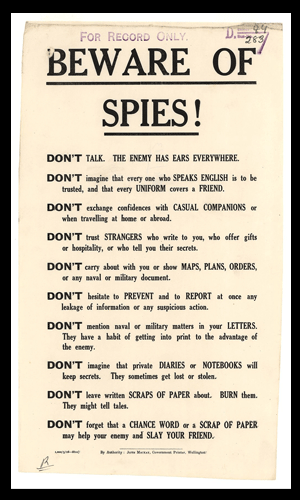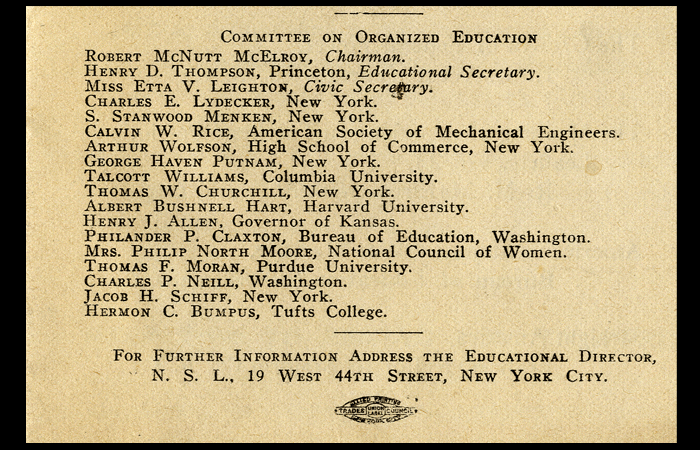National Security League

Under the auspices of national defense, the National Security League (1914-1939) advocated for a range of domestic policies, including universal conscription, an interstate highway system, and the naturalization of immigrants. Founded in December 1914 by corporate attorney Solomon Stanwood Menken, the NSL developed into what historian Robert D. Ward has called "the largest and perhaps the most influential of the groups that worked for preparedness" during World War I.8 By the close of the war, the NSL boasted branches in 22 states—as well as Cuba and Hawaii—with a total membership of some 85,000 members.9
The mission of the organization shifted markedly in its early years. After Menken created the NSL to evaluate the nation's preparedness for war, between 1915-1917 the organization's mission expanded to include instituting universal military service, promoting patriotic education, and even limiting free speech. (To the latter point, the NSL actively supported both the Espionage Act of 1917 and the Sedition Act of 1918.) In 1918 Charles E. Lydecker, a New York state national guard colonel, succeeded Menken and charted a new course for the organization. Arguing that a "great propaganda" would steady the nation postwar, Lydecker tasked former Secretary of State—and APS Member—Elihu Root with reorganizing the NSL to address postwar problems.10 Root pursued that directive through eight committees: world peace, demobilized army activities, naturalization and citizenship, constitution and national integrity, national legislators, unity of language, universal military training, and an education committee (the Committee on Organized Education) which Lydecker intended for "teaching the meaning and value of our constitution and the maintenance of our national integrity."11
Congressional Investigation

TThe Committee on Organized Education published this "Americanization" pamphlet during a portentous moment for the NSL. In the 1918 midterm elections, the organization spent prodigious sums to defeat congressmen who opposed its policies, and in so doing, earned a equally prodigious number of political enemies. (In fact, the NSL ratings of congressional voting records—which identified members' "right" and "wrong" votes—provides an antecedent to the scoring performed by contemporary interest groups and political action committees, such as Americans for Tax Reform and the National Rifle Association.) Democrats lost control of the House in a rebuke of President Wilson's postwar foreign policy. That December, Representative Edward W. Pou introduced a resolution to form a committee to investigate the officers, membership, financial support, expenditures, and political activity of the National Security League. The committee ultimately found the NSL violated the Federal Corrupt Practices Act.12
Of perhaps greater consequence, the committee publicized the vast network of northern financiers and industrial elites who supported the National Security League, including a $100,000 contribution from the Carnegie Corporation, for which Elihu Root served as director (United States House of Representatives, 158). As you might remember from the pamphlet, which asked businessman to show generosity to immigrant workers, the NSL advocated for philanthropy rather than government intervention in the economy. The organization's membership declined precipitously with public scrutiny of sponsors. While the NSL continued to operate for another two decades (the organization went bankrupt in 1939), 1919 arguably marked the organization's apogee in terms of membership and political influence.
Today, the NSL carries a number of unflattering associations. The 1920s saw the organization drift towards nationalistic chauvinism and red-baiting. Even in its early years, the NSL gained a reputation for corporate greed, which was validated, in some respects, during the congressional investigation into its membership and finances. However, John Carver Edwards has argued that, at its outset, the organization attracted what he calls "warrior aristocrats" who feared social disorder and sought to promote stability through war preparedness, infrastructure investment, and assimilation efforts.13
